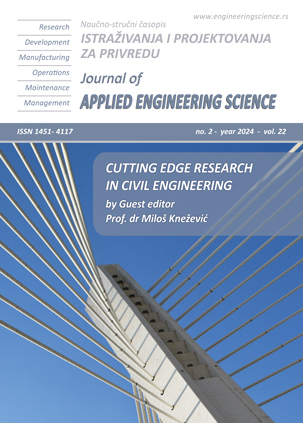INFLUENCE OF ACCELERATED AGEING ON PULL-OFF STRENGTH OF CONCRETE PRODUCED WITH RECYCLED CONCRETE AGGREGATE AND BLENDED WITH HEMP FIBERS
Abstract
As a result of rising demand for non-renewable resources, high energy consumption, and, most importantly, unfavourable environmental consequences, the construction sector is switching to environmentally friendly products. Some feasible options for developing alternative low-cost, renewable and green materials include the utilization of natural fibers and recycled materials from construction and demolition (C&D) waste. This report summarizes a portion of the experimental research being conducted as part of a bilateral research project: ''BIO-based cementitious composites with recycled aggregates (Bio-gates),'' performed by teams from Novi Sad's Faculty of Technical Sciences and Vienna's Technical University. This research explores the impact of hemp fibers and recycled concrete aggregate (RCA) on the pull off strength of concrete, cured under normal conditions and subjected to wet/dry cycles (accelerated ageing regime). The obtained results revealed that RCA has no detrimental effect on the adhesive bond, while hemp fibers reduce the pull off strength of concrete to a greater extent. Nonetheless, adhesion to the substrate may be regarded satisfactory for all tested concrete types when the limit values specified in the applicable regulations are taken into account.
References
Awwad, E., Mabsout, M., Hamad, B., Farran, M.T., Khatib, H. (2012). Studies on fiber-reinforced concrete using industrial hemp fibers. Construction and Building Materials, Vol. 35, p. 710-717. DOI: 10.1016/j.conbuildmat.2012.04.119.
European Commission: Hemp production in the EU. Agriculture and rural development, 2023.
Song, H., Liu, T., Gauvin, F. (2024). Enhancing mechanical performance of green fiber cement composites: Role of eco-friendly alkyl ketene dimer on surfaces of hemp fibers. Journal of Materials Research and Technology, Vol. 28, p. 3121-3132, DOI: 10.1016/j.jmrt.2023.12.255.
Çomak, B., Bideci, A., Bideci, Ö.S. (2018). Effects of hemp fibers on characteristics of cement-based mortar. Construction and Building Materials, Vol. 169, p. 794-799, DOI: 10.1016/j.conbuildmat.2018.03.029.
Ruano, G., Bellomo, F., Lopez, G., Bertuzzi, A., Nallim, L., Oller, S. (2020). Mechanical behavior of cementitious composites reinforced with bagasse and hemp fibers. Construction and Building Materials, Vol. 240, 117856, DOI: /10.1016/j.conbuildmat.2019.117856.
Benmahiddine, F., Bennai, F., Cherif, R., Belarbi, R., Tahakourt, A., Abahri, K. (2020). Experimental investigation on the influence of immersion/drying cycles on the hygrothermal and mechanical properties of hemp concrete. Journal of Building Engineering, Vol. 32, 101758, DOI: 10.1016/j.jobe.2020.101758.
Poletanović, B., Janotka, I., Janek, M., Bacuvcik, M., Merta, I. (2021). Influence of the NaOH-treated hemp fibers on the properties of fly-ash based alkali-activated mortars prior and after wet/dry cycles. Construction and Building Materials, Vol. 309, 125072, DOI: 10.1016/j.conbuildmat.2021.125072.
Nakarai, K., Yoshida, T. (2015). Effect of carbonation on strength development of cement-treated Toyoura silica sand. Soils and Foundations, Vol. 55 (4), p. 857-865, DOI: 10.1016/j.sandf.2015.06.016.
SRPS EN 1504-3:2020: Products and systems for the protection and repair of concrete structures - Definitions, requirements, quality control and evaluation of conformity - Part 3: Structural and non-structural repair.

